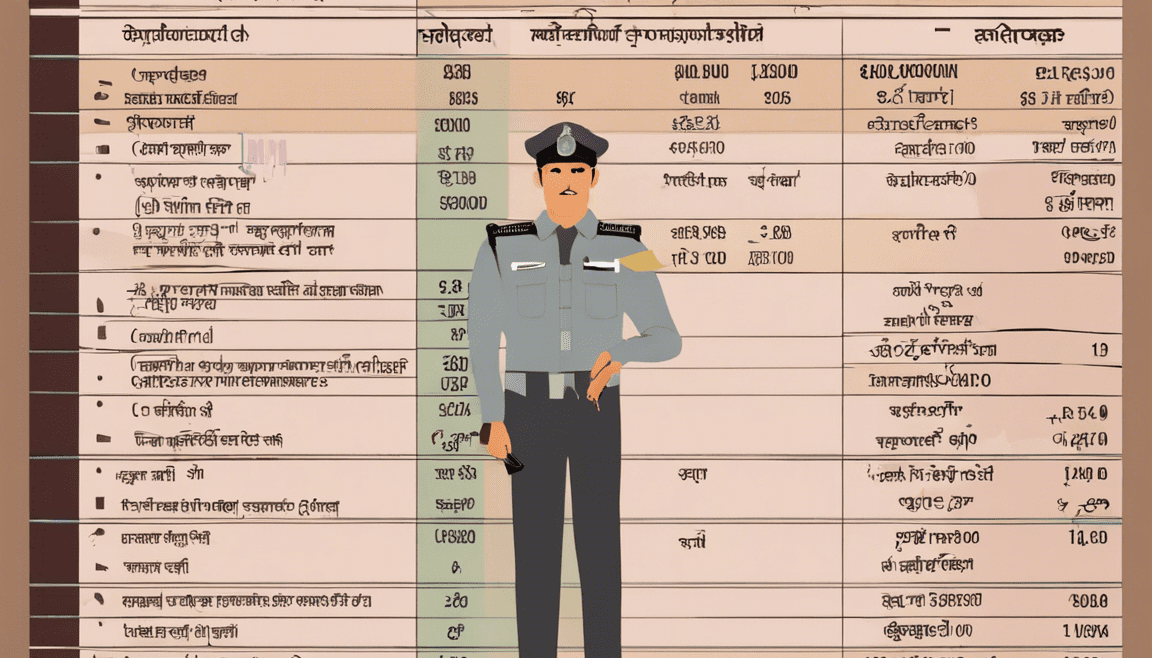Being a sub-inspector in the police force is a challenging yet rewarding career choice. It requires individuals to uphold law and order, investigate crimes, and ensure the safety of the community. One crucial aspect that potential sub-inspectors often consider is the salary they can expect in this role. In this article, we will delve into the details of a sub-inspector’s salary, including the various components that make up their earnings, incentives, allowances, and career progression opportunities.
Understanding the Role of a Sub-Inspector
Before we discuss the salary, it’s essential to understand the duties and responsibilities of a sub-inspector. A sub-inspector is a non-gazetted officer in the police department who is responsible for various tasks such as:
- Maintaining Law and Order: Ensuring that laws are obeyed and order is maintained in their jurisdiction.
- Investigating Crimes: Conducting investigations, collecting evidence, and making arrests in criminal cases.
- Supervising Police Operations: Overseeing constables and other junior officers in daily policing activities.
- Performing Administrative Duties: Handling paperwork, preparing reports, and coordinating with other law enforcement agencies.
Salary Structure of a Sub-Inspector
The salary of a sub-inspector is determined by various factors, including their years of service, location, and the rules and regulations of the specific state or country. However, we can provide a general overview of the typical salary structure of a sub-inspector.
-
Basic Pay: The basic pay of a sub-inspector ranges from INR 35,400 to INR 1,12,400 per month, depending on their grade and experience level.
-
Grade Pay: Sub-inspectors also receive a grade pay, which can range from INR 4,200 to INR 10,000 per month.
-
Dearness Allowance (DA): DA is provided to offset the impact of inflation on employees’ salaries. It is usually a percentage of the basic pay and can range from 17% to 28%.
-
House Rent Allowance (HRA): Sub-inspectors are also eligible for HRA, which varies based on the location of their posting. It can range from 8% to 24% of the basic pay.
-
Transport Allowance: Sub-inspectors receive a transport allowance to cover their commuting expenses. This amount can vary based on the organization’s policies.
-
Other Allowances: Apart from the above components, sub-inspectors may also receive other allowances such as medical allowance, uniform allowance, and more.
Incentives and Benefits
In addition to the salary components mentioned above, sub-inspectors may also be eligible for various incentives and benefits, including:
- Overtime Pay: For any extra hours worked beyond the regular duty hours.
- Performance Bonus: Based on their performance appraisal and achievements.
- Pension and Retirement Benefits: Ensuring financial security post-retirement.
- Health Insurance: Coverage for medical expenses for the officer and their family.
- Education Allowance: For the education of the officer’s children.
- Loan Facilities: Some organizations provide loan facilities at subsidized interest rates.
Career Progression and Promotions
One of the significant advantages of a career in the police force is the opportunity for career growth and promotions. Sub-inspectors can progress to higher ranks such as Inspector, Deputy Superintendent of Police (DSP), Superintendent of Police (SP), and even higher ranks based on their experience, performance, and qualifications. With each promotion, there is a substantial increase in salary and allowances.
Frequently Asked Questions (FAQs)
- How long does it take to become a sub-inspector?
-
The duration can vary, but in general, it takes around 3-5 years, including training, to become a sub-inspector.
-
Can a sub-inspector become an IPS officer?
-
Yes, through promotions and departmental exams, a sub-inspector can climb the ranks to become an IPS officer.
-
Is the salary of a sub-inspector the same across all states in India?
-
No, the salary may vary based on the state’s policies, cost of living, and other factors.
-
What qualifications are required to become a sub-inspector?
-
Generally, a bachelor’s degree from a recognized university is required to be eligible for the position of sub-inspector.
-
Are there any allowances for night shifts or extra duties?
- Yes, sub-inspectors are usually compensated for night shifts, overtime, and extra duties as per the organization’s regulations.
In conclusion, the salary of a sub-inspector is an attractive aspect of the job, along with the inherent job security, opportunities for career growth, and serving the community. It’s crucial to consider not just the salary figures but also the overall benefits, allowances, and incentives when evaluating this career path. Whether one chooses this path for the love of service or the financial rewards, being a sub-inspector is a noble profession that contributes significantly to society’s well-being.


